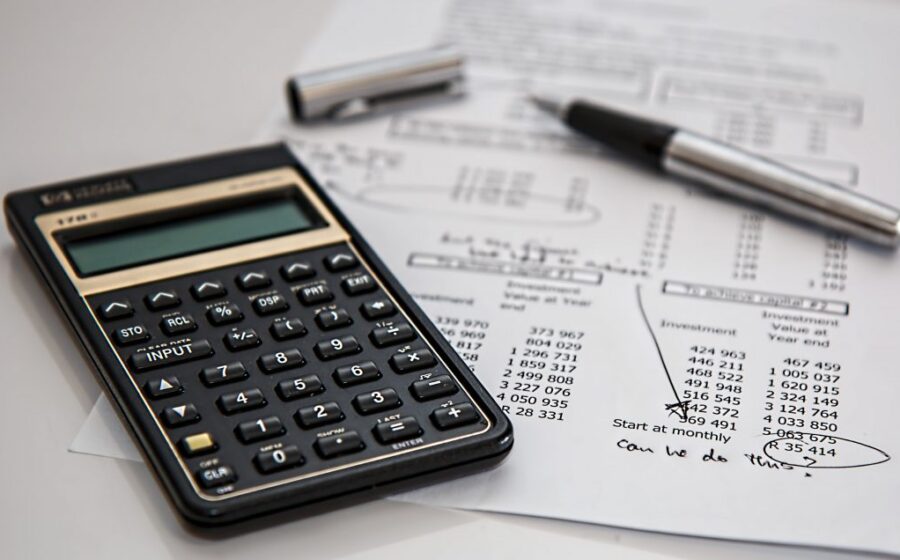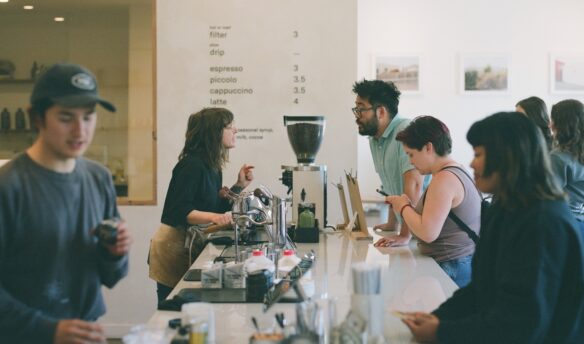[T]he coffee industry in the United States has a combined annual revenue of about $12 billion, which is poised to reach $46.2 billion by 2021. The rapid growth of this industry is encouraging entrepreneurs to open a café, and existing business owners to consider expanding their operations. There’s plenty of room for growth for the coffee shop industry in the United States: Italy has a population of 60.8 million and over 200,000 coffee shops, while the United States has a population of 321.4 million and only 22,000 coffee shops! To start your business plan strong, let’s review key considerations when building a budget for your coffee shop.
Budget Ranges for Coffee Shops of All Sizes
According to estimates, it can take as little as $10,000 to start a coffee kiosk. It all comes down to your coffee shop concept. For example, Sid Chitnis and his wife, owners of Saltwater in New York City, which is set to open next month. To make their café profitable, they looked for a site that was big enough to seat nine people for a relaxing five-to-ten minute experience—and then go.
Here is a range of startup costs that you can expect, according to data from Bellissimo Coffee Advisors in Portland, Oregon:
- Coffee cart: $20,000 to $25,000
- Coffee kiosk: $25,000 to $75,000
- Drive-thru location: small: under $35,000; large: $80,000 to $200,000
- Sit-down location: average cost of a 1,200 sq. ft. Coffee bar: $200,000 to $375,000
Key criteria that will determine your budget are your location, range of menu, initial operating capital, and equipment. Expect to pay anywhere from $5,000 to $15,000 for an espresso machine. A Rancilio Classe 7 E ranges from $7,900 to $11,500 and Nuova Simonelli Appia Compact 2 starts at $6,030. Adding food items with a high profit margin may be useful to boost profits but may also increase your need for storage space and equipment.
In the business plan of a hypothetical Oregon-based 2,300 square foot shop that sells coffee, and other beverages and snacks, nearly 40 percent of the total initial investment is to cover operating capital for the first three months (two months’ worth of salaries and cash reserves for the first three months of operation). About 35 percent would be allocated to equipment, with 10 percent going to food service equipment, such as a microwave, toasters, a dishwasher, refrigerator, and blender.
Creating a Budget for Your Coffee Shop
Now, let’s break down the total budget into specific expenses.
Set up an easy-to-access spreadsheet
Use a spreadsheet that you can access on-the-go. If you prefer to use MS Excel, one option is to store it on a cloud-based storage solution, such as Dropbox. If you’re comfortable with spreadsheets that work right on your browser, then opt for a Google Spreadsheet or Excel Online.
Break down the year into months to keep track on actual amounts
That way you’ll keep better track on how much (or little!) you allocated to specific expenses. “There will be months in which we don’t fully utilize our marketing budget, for example, or perhaps we didn’t spend as much on cups and packaging as we anticipated. Having a little room for these things means we can reallocate funds for contingent needs (e.g., an emergency call to the plumber) or, better yet, keep that money in the bank!” recommends Jonathan Riethmaier from Mammoth Espresso in New Orleans, Louisiana.
Keep track of all expenses under their own category
It’s great to know that your total expenses are $120,000. But it’s even better to know that $50,000, $40,000, and $30,000 go to wages, rent, and equipment and inventory. This will give you the edge to fine-tune your budget and take advantage of small business tax deductions.
Put it all together
Download a ready-for-use template for Excel here, and adjust it to the unique needs of your coffee shop.
Best Practices for Coffee Shop Budgeting
Here is expert advice from seasoned coffee shop owners across the country.
Don’t cut corners with your espresso machine
Christopher Feran, owner of Phoenix Coffee in Cleveland, Ohio warns, “I know it feels responsible to buy a used espresso machine–don’t! You don’t know the service history of that machine, what water it was connected to, how it was stored…. resist the urge!” He adds that is worth paying for the security and peace of mind of a warranty and service contract with a respectable technician.
Find a sweet spot between efficiency, service contract, and brand. “Since your roaster buys anywhere from twenty to thirty machines, he or she is a great resource on what model to buy for your business,” adds Chitnis from Saltwater.
Surround yourself with great people
Don’t stop at your roaster. “Whether it be your accountant, architect, coffee roaster, or another partner, find people you can trust, allow them to do their job, and focus your energy on the areas where you can have the greatest impact,” recommends Mammoth’s Riethmaier.
- Accountant: “We had two accountants that were really horrible and cost us dearly. We got audited, and rightly so, by the IRS for mistakes both had made. It ended up being far more costly in both time and money than bucking up for a quality accountant from the get go,” warns Geoffrey Meeker from French Truck Coffee in New Orleans, Louisiana.
- Architect: “I recommend spending a good amount of time with your architect and your city planning department prior to securing funding or signing a lease on a space that may end up costing more than you know,” recommends Joe Shafer from Slow by Slow in Boise, Idaho.
- Landlord: “My landlord told me to get a good electrician and plumber. By finding contractors who are certified, you protect your liability if anything goes wrong,” advises Chitnis from Saltwater.
Study your city’s fees and permits
“In Minneapolis, we were hit with a Sewer Access Charge (SAC) fee. This is how the city keeps up with the cost of the sewer and water system in the Twin Cities. For us being a “change of use” designation for the space that we chose we were charged an extra $4,000 that we did not budget for at all,”suggests Caleb Garn from Five Watt Coffee and Big Watt Bev Co. in Minneapolis, Minnesota.
Building permits can drive up your renovation costs. “The amount that was needed for impact fees and building permits cost nearly as much as the work itself, and though we were able to make that work, it definitely would have been helpful to get more in depth with the city of Boise on how much converting our space to foodservice would cost,” explains Slow by Slow’s Shafer.
Secure working capital to avoid cash crunches
Cash flow is the bloodline of any business. “I wish I would have prioritized having working capital in the bank when we opened to have room to grow once the dust settled after our first six months,” points out Lindsay Windsor from Lord Windsor Coffee in Long Beach, California.
For new coffee shops with no revenue or those which aren’t yet profitable, you may consider taking out a loan from friends or family, or checking out crowdfunding platforms like Kickstarter or Indiegogo.
If your business is already (somewhat) established, you have a lot of options. While debt financing may seem scary at first, it’s actually a tool that is used by most entrepreneurs to unlock growth for their business. If you understand your business and its cost of capital, debt is very manageable and really an asset. From terms loans to merchant cash advances to invoice financing, there are several options available to meet your cash flow financing needs.
Looking for additional insights from experienced coffee shop owners? Check out thirty-four pieces of advice in another blog by Bond Street: What I Wish I Knew: Coffee Shops.
—Samantha Novick is content manager at Bond Street, a small business blog designed to make business growth simple, transparent, and fair.















